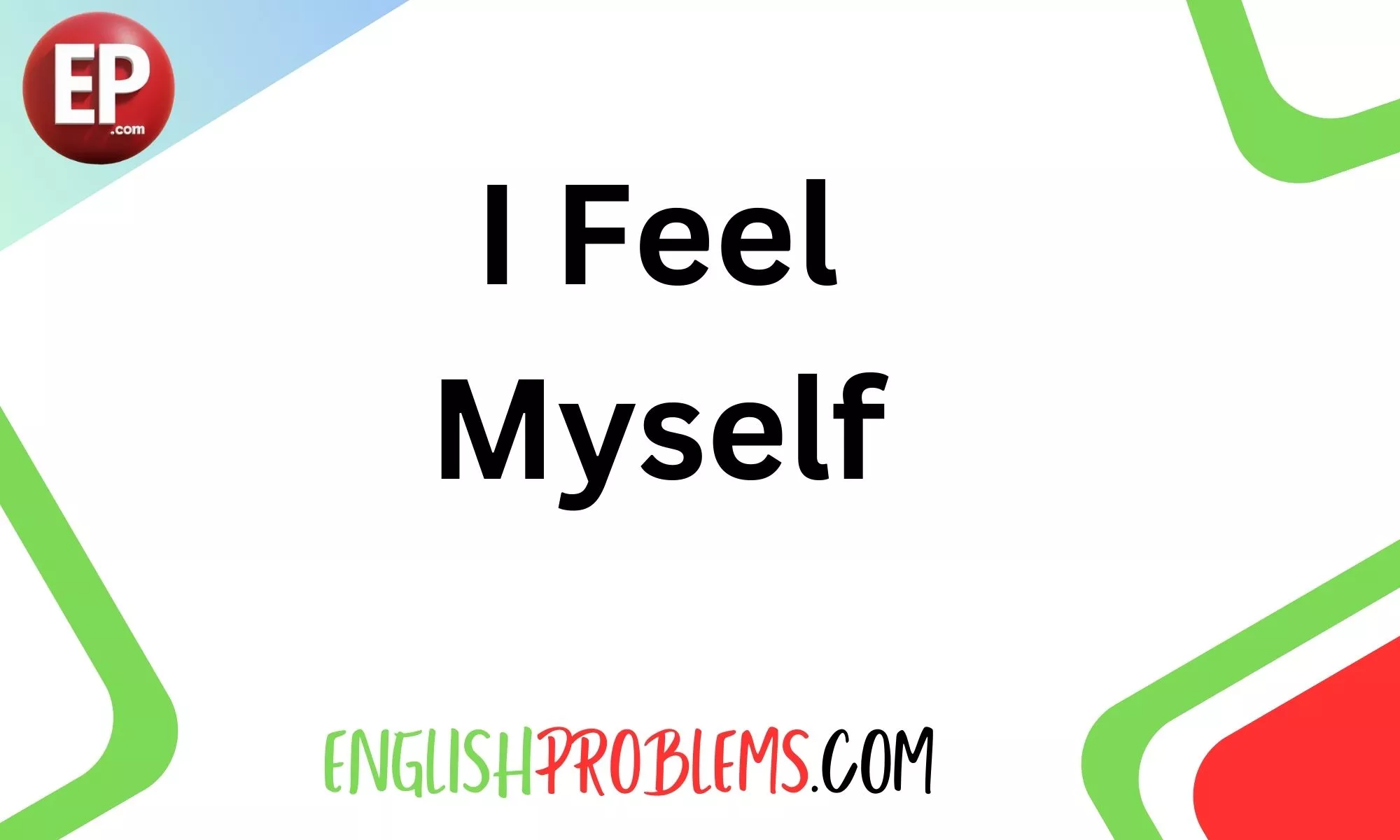Understanding the phrase “I feel myself” can be a bit tricky, as it carries different meanings depending on the context. This comprehensive guide will dive into the various interpretations, common errors, and practical usage of this expression.
Whether you’re looking to enhance your language skills or simply curious about the phrase, this article will provide valuable insights and examples.
What Does “I Feel Myself” Mean?
The phrase “I feel myself” can be interpreted in different ways depending on the situation. Generally, it implies an awareness or sensation of one’s own emotions or physical state. It is essential to distinguish between emotional and physical contexts to grasp the full meaning.
Emotional Context
In emotional contexts, saying “I feel myself” often means that someone is attuned to their own emotional state. For instance, it might indicate self-awareness or introspection. You might say, “I feel myself becoming more confident,” which reflects an internal emotional shift.
Physical Context
In physical contexts, the phrase might refer to an awareness of one’s bodily sensations. For example, “I feel myself getting tired” suggests a recognition of physical fatigue.
Emotional vs. Physical States
To fully understand “I feel myself,” it’s crucial to differentiate between emotional and physical states.
Emotional States
Emotional states refer to internal feelings and psychological conditions. These include joy, sadness, anger, and excitement. The phrase might be used to express a change or recognition of these emotions. Here are some common emotional states:
- Happiness: “I feel myself getting happier every day.”
- Sadness: “I feel myself sinking into sadness.”
- Anger: “I feel myself growing angrier with each passing minute.”
Physical Experiences
Physical experiences involve bodily sensations and conditions. These can include fatigue, pain, or physical alertness. Examples include:
- Fatigue: “I feel myself getting tired after the long run.”
- Pain: “I feel myself aching after lifting weights.”
- Alertness: “I feel myself becoming more awake after the coffee.”
Understanding Emotional States
Emotional Awareness
Emotional awareness is the ability to recognize and understand one’s own emotions. When you say “I feel myself” in an emotional sense, it often reflects a deeper self-awareness. For example:
- Self-Awareness: “I feel myself becoming more aware of my emotions lately.”
- Growth: “I feel myself growing emotionally after the therapy sessions.”
Examples of Emotional States
- Confidence: “I feel myself becoming more confident in social situations.”
- Anxiety: “I feel myself getting anxious before the presentation.”
- Contentment: “I feel myself settling into a state of contentment.”
Understanding Physical Experiences
Physical Sensations
Physical sensations are tangible experiences involving the body. Recognizing these sensations can help in describing physical conditions more accurately. When using “I feel myself” in a physical context, you might be:
- Tracking Changes: “I feel myself getting more sore after each workout.”
- Describing Sensations: “I feel myself shivering in the cold.”
Examples of Physical Experiences
- Fatigue: “I feel myself becoming more exhausted after the hike.”
- Pain: “I feel myself aching from the new exercise routine.”
- Alertness: “I feel myself getting more alert after a good night’s sleep.”
Examples of “I Feel Myself” in Sentences
To clarify how “I feel myself” can be used, here are some practical examples illustrating different contexts:
Emotional Contexts
- “I feel myself becoming more optimistic about the future.”
- “I feel myself reliving the joy from my recent success.”
Physical Contexts
- “I feel myself relaxing as I stretch.”
- “I feel myself sweating during the intense workout.”
Examples With Participles
Participles can add nuance to the phrase “I feel myself”. Here are examples showing how participles affect the meaning:
Emotional Examples
- Feeling: “I feel myself becoming more understanding after listening to others.”
- Growing: “I feel myself growing more empathetic towards others’ struggles.”
Physical Examples
- Sensing: “I feel myself sensing the fatigue setting in after the marathon.”
- Noticing: “I feel myself noticing the tightness in my muscles after exercising.”
Common Errors and Corrections
Using “I feel myself” correctly requires attention to context and syntax. Here are some common errors and how to correct them:
Common Mistakes
- Misuse of Context: Using the phrase interchangeably between emotional and physical contexts can lead to confusion. For example, saying “I feel myself emotionally tired” can be ambiguous.
Corrections
- Correct Usage: For emotional contexts, specify the emotion: “I feel myself becoming more anxious.”
- For Physical Contexts: Use clear descriptors: “I feel myself physically exhausted from the workout.”
Usage of “I Feel Myself” in Everyday Language
In everyday conversations, “I feel myself” might be used casually or in specific contexts. Here’s how it generally appears:
Casual Usage
- “I feel myself getting hungry; let’s grab a bite.”
- “I feel myself relaxing as I listen to music.”
Formal Usage
- “I feel myself developing a greater understanding of the topic after extensive study.”
Physical Sensations vs. Emotions
Understanding the difference between physical sensations and emotions can help clarify the use of “I feel myself.”
Physical Sensations
- Definition: Bodily experiences related to health, fatigue, or physical conditions.
- Examples: Sweating, shivering, or feeling pain.
Emotions
- Definition: Internal feelings or psychological responses.
- Examples: Happiness, anxiety, or sadness.
Why Understanding Context is Important
Context plays a crucial role in interpreting “I feel myself.” The same phrase can imply different meanings depending on the situation.
Contextual Impact
- Emotional Context: Reflects inner feelings and self-awareness.
- Physical Context: Indicates bodily sensations or changes.
Examples
- Emotional Context: “I feel myself becoming more confident.” (Refers to internal growth)
- Physical Context: “I feel myself growing tired.” (Refers to physical exhaustion)
Different Interpretations of “I Feel Myself”
The phrase can have varied interpretations based on its context. Here are some examples:
Emotional Interpretations
- Self-Recognition: “I feel myself understanding my emotions better.”
- Growth: “I feel myself evolving emotionally after the experience.”
Physical Interpretations
- Awareness of Physical State: “I feel myself aching after the run.”
- Sensory Perception: “I feel myself shivering from the cold.”
Tips for Using “I Feel Myself” Correctly
To use “I feel myself” accurately, follow these tips:
Be Specific
- Emotional: Clearly define the emotion. “I feel myself becoming more content.”
- Physical: Describe the physical sensation precisely. “I feel myself sweating heavily.”
Consider the Context
- Ensure the context aligns with the intended meaning. Use emotional contexts for psychological states and physical contexts for bodily sensations.
Avoid Ambiguity
- If in doubt, clarify the intended meaning to avoid confusion. Use additional descriptors if needed.
Conclusion
The phrase “I feel myself” holds varied meanings depending on its use in emotional or physical contexts. By understanding the differences and applying the tips outlined, you can use this expression accurately and effectively. Recognizing the role of context and being specific in your descriptions will enhance your communication skills and ensure clarity in your expression.

Mia Evans brings a love for language and a knack for clarity to EnglishProblems.com. Her engaging writing style and expert knowledge help readers navigate the tricky terrain of English grammar with confidence and ease.










